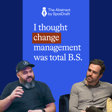
Ep 30: Leading Legal in Complex Regulatory Environments: Hardeep Singh, GC, CRED
How is tech changing India’s financial services industry? How do you deal with complex regulations that change as rapidly as tech products do? And how can a multinational company expand into India’s culturally, geographically, and linguistically diverse market?
Hardeep Singh, General Counsel at CRED, has faced these challenges head-on. Starting his career in litigation, he moved on to in-house counsel for Uber in Delhi and helped pioneer solutions to improve the city’s public transit. Now he leads the legal team at CRED, a reward-based credit card payment app that integrates with India’s massive mobile payment system.
Hear Hardeep as he shares his experiences structuring M&A deals, navigating nuanced regulations, leading legal for a dynamic design-based product, and finding motivation from solving real world problems.
Read detailed summary: https://www.spotdraft.com/podcast/episode-30
Topics:
Introduction: 1:17
Launching your legal career: 1:52
Switching to corporate counsel from an appellate practice in Delhi: 5:27
Applying lessons from Uber to your legal leadership at CRED: 8:50
Explaining CRED: 12:45
Encountering a learning curve as a first-time team leader: 16:31
Considering the role of legal in an organization without titles: 22:18
Lessons learned from M&A at CRED: 27:46
Working in India’s legal landscape: 33:37
Driving communication, marketing and PR in legal: 37:15
Understanding UPI, India’s unified payment interface: 39:40
Advice to companies trying to expand into the Indian economy: 45:54
Book recommendations: 50:23
Advice to your younger self: 53:25
Connect with us:
Hardeep Singh - https://www.linkedin.com/in/hardeep-singh-863b1617/
Tyler Finn - https://www.linkedin.com/in/tylerhfinn
SpotDraft - https://www.linkedin.com/company/spotdraft
SpotDraft is a leading CLM platform that solves your end-to-end contract management issues. Visit https://www.spotdraft.com to learn more.



















